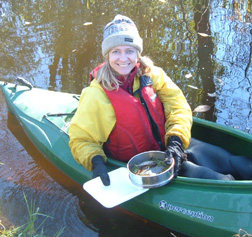200 Hodson Hall
1980 Folwell Avenue
University of Minnesota
St. Paul, MN 55108
Education
B.A. Biology/Environmental Studies, St Olaf College, Northfield MN
M.S.Water Resources Science, University of Minnesota
Background
I grew up on a small, family-owned dairy farm in Central Minnesota. According to my mother, I was always an outdoor explorer and inquisitive child, often seen observing the behaviors and feeding habits of the insects in my environment—from ants, ladybugs, butterflies and other small invertebrate creatures. Early on, I developed an appreciation for natural environments through my father. He taught me how to be a responsible landowner and community member—through implementing soil conservation practices, sustainable forestry, and water quality protection strategies.
I pursued my biology interests and earned my Bachelor’s Degree from St. Olaf College in Northfield, MN. While at St Olaf, I enriched my leaning experience by participating in study abroad programs in Australia and India. During my sophomore year, I participated in the Natural Resources Semester in Australia/New Zealand through the University of Wisconsin Stevens Point. While there, I also conducted an independent study on seasonal tidal zonation patterns and assisted the National Parks and Wildlife Service on designing a koala habitat protection plan.
During my senior year, I participated in the Biology in South India work-study program in Tamil Nadu South India. After a month of language, history and cultural submersion, I spent time at the Rural Unit in Social Affairs (RUHSA) where I surveyed local farmers’ perceptions to DDT and natural pest control strategies, market economics, and water scarcity issues.
Since college, I worked for the USDA-APHIS Gypsy Moth control program and for the MPCA in biological stream monitoring. In 2003 I was a field work volunteer at CEH-Dorset working with Kathleen Beyer, a PhD candidate studying the effects on non-native fish introductions on fish community structure. Currently, I serve as an alternate commissioner for the Shingle Creek Watershed Commission.
In September 2004 I entered the Water Resources Science Program at the University of Minnesota. My research and professional interests include water quality monitoring using macroinvertebrates and fish, hydrologic and anthropogenic channel alteration, and the TMDL remediation process. After obtaining my degree, I plan to work for a local consulting firm, agency, or watershed organization. I would also enjoy volunteering my time with programs that train citizen stream monitors and educate the public about aquatic organisms in our environment, the effects of water pollution, and ways to be a responsible landowner and citizen.
Projects
Macroinvertebrate Communities in Depressional Wetlands of Minnesota (Research Assistantship)
Assessing the Relationship between Channel Stability, Habitat Quality, and Biota (MS Thesis, in progress)
